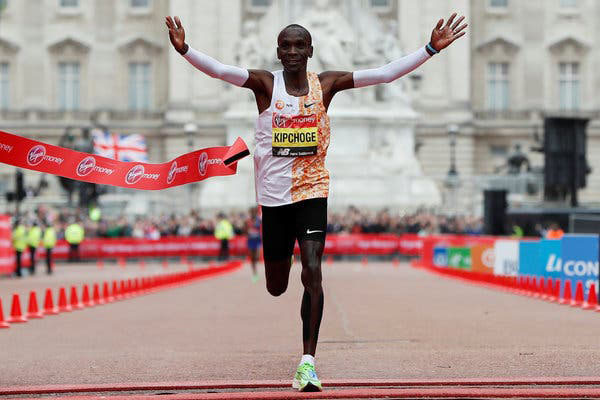NAIROBI (Reuters) – Eliud Kipchoge, the greatest marathon runner in history, the world record holder and only man to go under two hours for the distance, has told Reuters he will defend his Olympic title in Tokyo next year – if selected.
It should be reasonably safe to assume, even taking into account the often chaotic and inexplicable selection procedures that have long dogged Kenyan athletics, that Kipchoge will be given the chance to run next August.
“If selected I will be there.” he told Reuters in an exclusive interview in Nairobi yesterday.
“It (Tokyo) is at the front of my mind, and I trust and believe that when the time comes I will be on the starting line.”
That line will now be in the northern city of Sapporo, where the marathons and walking events have been moved by the International Olympic Committee (IOC) in a bid to avoid the worst of the debilitating heat and humidity of the Tokyo area.
But Kipchoge, as ever, was careful not to voice a strong opinion on the issue.
“I think the medals are the same,” he said. “I will be among the competitors, I don’t complain, I’m in the hands of the IOC and anywhere they decide, I will go with it.”
That will be music to the ears of the organizers, especially in marathon-mad Japan, where the 35-year-old will be treated to the sort of adulation last seen when sprinter Usain Bolt was sweeping all before him.
Kipchoge has won 11 of his 12 official marathons, including the 2016 Rio Olympics, and with the world record and the sub-two hour mark under his belt, along with a string of lucrative big-city races he is a colossus of his sport.
However, there are a growing number of critics who, while accepting his extraordinary talent, say that his and others’ record-breaking times should be treated with a grain of salt, such is the benefit available from the latest running shoes.
Kipchoge became the first man to run a marathon under two hours in October and also set the official world record for the distance of 2:01.39 in Berlin last year – both performances helped by controversial prototypes of his Nike shoes.
The shoes have carbon-fibre plates and a thicker midsole that the manufacturers claim improve running economy by 4% or 5%.
Various versions of them have been worn by many of the leading distance runners in recent years, including Kipchoge’s compatriot Brigid Kosgei, who smashed the 16-year-old women’s marathon record by 81 seconds a day after Kipchoge cruised to his remarkable, pacer-aided 1:59.40 in Vienna.
This has led to calls for restrictions on the manufacturing process of the shoes, but Kipchoge is against the idea. “This world is full of development and development comes with technology,” he said.
“I trust that even in the shoe sector, technology should be there. It’s not a big (advantage), it’s not a rocket science with the shoes…The shoe actually helps a runner to recover very fast, especially after the marathon.
“All in all, it’s a normal shoe – it’s the human being that runs.”





